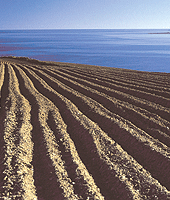Advertisement
Movement in Organic Agriculture
The worldwide push for organic growing is gathering strength under the umbrella organization, the International Federation of Organic Agriculture Movements (IFOAM). IFOAM currently has 750 members in 100 countries, most of whom were at the 14th World Congress in Victoria, BC, last August. The congress was followed by one of the first world exhibitions of … Continued
 The worldwide push for organic growing is gathering strength under the umbrella organization, the International Federation of Organic Agriculture Movements (IFOAM). IFOAM currently has 750 members in 100 countries, most of whom were at the 14th World Congress in Victoria, BC, last August. The congress was followed by one of the first world exhibitions of organic foods, which took place on the grounds of the well-known St. Anne’s Academy. (Last year, the owners of the academy adopted organic standards for the gardens of the six-acre property in downtown Victoria.)
The worldwide push for organic growing is gathering strength under the umbrella organization, the International Federation of Organic Agriculture Movements (IFOAM). IFOAM currently has 750 members in 100 countries, most of whom were at the 14th World Congress in Victoria, BC, last August. The congress was followed by one of the first world exhibitions of organic foods, which took place on the grounds of the well-known St. Anne’s Academy. (Last year, the owners of the academy adopted organic standards for the gardens of the six-acre property in downtown Victoria.)
Prior to the congress, Canadian and South Asian organic farmers met to share their experiences in ecological farming practices and food production. The men and women were from Pakistan, India, Nepal, Sri Lanka, Bangladesh and the Canadian provinces of BC, Manitoba, Saskatchewan and Quebec.
Farhad Muzharul from Bangladesh stated an urgent need to take a common stand against corporate control of seed and to promote seed-saving practices among farmers. In his own country, he has initiated a movement involving 100,000 farmers to develop biodiversity- based food production.
“Seed is fundamental to our food systems,” Muzharul declared. “It must remain in the hands of farmers.”
The 14th IFOAM World Congress in Victoria was followed last November by a trade conference in New Delhi, India, to bring together international buyers of organics. It was organized by IFOAM in close association with the government of India. Then, in December, IFOAM and the Japanese government jointly hosted their annual international organic trade fair in Tokyo, Japan. Japan is the third largest consumer market for organic foods and natural products. Other organic trade fairs take place in Thailand this January and in Nuremberg, Germany, this February.
One of the tenets of IFOAM, adhered to by all member countries, is Social Accountability in Sustainable Agriculture (SASA). Pilot agricultural audits will be carried out worldwide by SASA over the next two years, covering a range of crops in both industrialized and developing countries. The first pilot audit was in June 2002 on banana plantations in Costa Rica. Pilot audits are done on strawberry crops in California, rice in Thailand, tea in India, oranges in Brazil, cut flowers in Columbia, vegetables in Sweden and cocoa in Africa. Further audits are planned for cotton, coffee and pineapple crops. The focus is to promote fair trade and sustainable agriculture in order to eliminate exploitation of indigenous workers and to preserve the land.
The next IFOAM World Congress takes place in Adelaide, Australia, in 2005.




